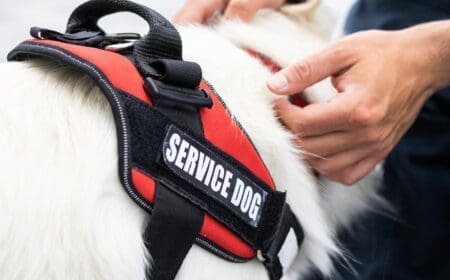Oregon doesn’t have its own emotional support animal (ESA) laws, so you have to adhere to the rules and regulations set forth by the federal government. If you are an ESA owner, then understanding these laws can make life easier for both you and your pet.
ESAs provide therapeutic support to their owners, and that’s why they’re not considered normal pets. You have to get an ESA letter from a licensed mental health professional in Oregon for your pet to be legally recognized as an ESA.
In this article, you are going to learn about the ESA laws in Oregon and various other things that will help you understand your rights and responsibilities as an ESA owner.
Is My Pet Considered an ESA in Oregon?
Whether you are eligible for an ESA is something only a licensed mental health professional can decide. It’s true that most pets, especially cats and dogs, are very good at sensing people’s emotions, and being with them can lift our moods, but an ESA is a legal designation that requires you to be evaluated by a licensed mental health worker in Oregon to ensure that having an ESA would help with your symptoms.
Dogs and cats are the most common types of ESAs, but an ESA can generally be any animal, including snakes, ferrets, mice, and birds. The purpose of these animals is to be there for their people who suffer from mental health disorders such as depression, anxiety, post-traumatic stress disorder (PTSD), and bipolar disorder. They provide emotional support and help them with at least one of their symptoms.
For example, if you feel depressed and find it difficult to make it through the day, then having an ESA by your side can give you the support you need.


If you have a pet that makes you feel better, and you can’t part from them, then we recommend that you see a licensed mental health professional in Oregon as soon as possible. They will talk to you about your mental health condition and see how your pet helps you with the symptoms.
Some LMHPs may schedule multiple sessions so they can accurately assess your mental state before giving you the letter. This letter is a legal requirement for all ESA owners in Oregon. It includes details about you, your psychiatric disability, your pet, and your mental health worker. It must have the LMHP’s signature on it and their contact details.
To protect your privacy, the letter doesn’t have to contain details about your mental health condition, as you’ll have to show it to people to prove that your pet is an ESA. It can simply explain that you have been diagnosed with a mental health condition by a licensed mental health professional in Oregon, and your pet’s presence is necessary for your emotional well-being.
Do ESAs Need an ID Card in Oregon?
No, ESAs don’t require an ID card or any other type of identification. You only need an ESA letter. If you already have one, then there’s no harm in getting an ID card. However, without an ESA letter, the ID card won’t mean anything.
There are many sites that sell ID cards and certifications. If you get your ESA registered with these sites, they also give you access to on-staff attorneys. They can also help you get in touch with a licensed mental health professional if you don’t already have an ESA letter.
How Long Does an ESA Letter Last in Oregon?
An ESA letter typically lasts for a year from the date it was issued to you. You can get it renewed either from the same mental health worker who gave you the first one or by another healthcare professional.
Note that it’s also possible for your ESA letter to be revoked if you neglect your emotional support animal or don’t follow the guidelines set by the federal government.
Taking care of your ESA is an important part of your recovery as it helps you build a healthy routine. You have to feed your emotional support animal on time and take them out for walks. You also have to schedule check-ups with a veterinarian. Just like you, your ESA needs love and attention as well, and you are the only person who can give them.
Differences Between ESAs and Service Animals in Oregon
Before we explain the laws that affect your emotional support animal, it’s first important to understand the distinction between ESAs and service animals.
ESAs have only one purpose – to boost your mood and provide comfort when you’re struggling with your mental health. These animals don’t require any formal training for it as it comes naturally to most of them.
Service animals, on the other hand, need to be trained for specific tasks to help people with disabilities. You can train them yourself if you know how to do it, but you can also hire a professional trainer to do it for you.
While an ESA can be any species, a service animal can only be a dog, and sometimes a miniature horse.
Another difference between the two types of animals is there’s no documentation required for service animals. You don’t need a “letter” from a licensed doctor or even a service animal vest. If anyone wants proof that your dog is a service animal, they can only ask you the following questions:
- Is your animal required because of a disability?
- What tasks is your animal capable of performing?
No one can ask you to make your dog demonstrate the task it has been trained to perform in order to prove its status as a service animal.
ESAs have less legal rights than service animals, and that’s because of the type of work they do. Service animals have to be with their owners at all times so they can assist them in managing their disabilities. For example, people with visual impairments may find it difficult to move around without the help of a guide dog. That’s why it’s important for them to have the freedom to accompany their owners everywhere.
For both ESAs and service animals, it’s important to teach them basic obedience skills so they don’t misbehave around other people and animals in public. No matter what type of animal you have with you, if they disturb anyone when you’re out, it can lead to you and your dog being asked to leave the premises.
ESA Laws in Oregon
These three laws pertain to housing, public accommodations, and air travel in Oregon. Below, we have explained all three in detail:
1. Fair Housing Act
The Fair Housing Act (FHA) is a federal law that was created to prevent people from being discriminated against on the basis of things like race, color, gender, religion, nationality, and disability in housing.
It covers both ESAs and service animals. People with either type of animal can have their assistance animal live with them in their residential house, even if it has a no-pet policy. A landlord has to provide reasonable accommodation to people with ESAs and service animals so they have equal access to housing as everyone else.
You have to provide proof that your pet is an ESA by showing the landlord your ESA letter. They can’t stop your ESA from moving into your apartment unless it requires them to significantly change the nature of their business or they have reasonable doubt that the animal could cause harm to other tenants. If your ESA has a history of aggressive behavior, for example, the landlord could reject your ESA letter.
Under the FHA, housing providers aren’t allowed to ask people with a valid ESA letter to pay a pet deposit or a cleaning fee. However, you will be required to pay for any damage caused to the property by your ESA.
Make sure that your ESA doesn’t leave your apartment or enter someone else’s. Communicate with your landlord and ask them if there are any places in the building where ESAs aren’t allowed.
When going out, you need to have some form of control over your ESA so they don’t bother other people or animals. You also need to make sure that you don’t leave it alone in your apartment for too long, as that could result in your ESA letter being revoked since you’re taking proper care of it.
2. Americans with Disabilities Act
The Americans with Disabilities Act (ADA) defines a service animal as “a dog that has been individually trained to do work or perform tasks for an individual with a disability.” According to this definition, an ESA is not a service animal and thus does not have any of the legal rights granted under the ADA.
This law allows service animals to go wherever their owners are permitted. Public places like restaurants and hotels must provide reasonable accommodation to people with disabilities.
ESAs, unfortunately, must adhere to pet policies in most public spaces. Some restaurants and workplaces may allow them, but you should call them to ask about their policies first. If they do allow your ESA to accompany you, then it’s your responsibility to make sure that they don’t disturb your coworkers or other patrons.
3. Air Carrier Access Act
The Air Carrier Access Act (ACAA) also defines a service animal as a dog that has been trained to perform a specific task for people with disabilities. It used to include ESAs, but regulations were changed in 2020, and now, airlines have no legal obligation to allow your ESA to fly in the cabin with you free of cost.


Planning to fly soon? Give the airline a call to confirm if they allow ESAs in the cabin.
Tips for ESA Owners in Oregon
Taking care of an ESA can be difficult. Here are some tips to help you make sure that your emotional support animal gets the love and attention they need and that you fulfill your responsibilities as an ESA owner:
-
- Daily exercise: Exercise is necessary for your emotional support animal’s physical and mental health. You can look up some videos on YouTube to find fun workout routines. Not only will it help your pet stay healthy, but it’ll also create a deep bond between you.
- Be patient and treat them with kindness: If your ESA exhibits signs of anxiety or aggression, don’t be harsh towards them. Try to understand the root cause of the issue or talk to a professional trainer who can help.
- Socialization: To make sure that your ESA doesn’t bother other animals or pets, try to introduce them to new environments while closely monitoring their behavior. Keep in mind that you can be evicted from an apartment if your ESA doesn’t behave well around other tenants and animals.
- Develop a routine: Creating a consistent routine for your ESA will help reduce stress and anxiety. It’ll motivate you to get out of bed every day because you know that it’s time to feed your ESA or take them for a walk.
- Understand the laws: As an ESA owner, it’s your responsibility to familiarize yourself with the laws. While the FHA may be the only one that grants special rights to ESAs, it’s important to understand the ADA and the ACAA, too. You can’t take your ESA to hotels and restaurants as they’re not legally required to provide you reasonable accommodation. It’s always best to call ahead to see if they accept ESAs.
- Get an ESA letter: The very first thing you want to do if you want your pet to be an ESA is to get an ESA letter from a licensed mental health professional in Oregon.
Living With Your ESA in Oregon
Now you know everything there is to know about ESA laws in Oregon. If you already have an ESA or you’re thinking about getting one, you shouldn’t have any problem navigating the rules and laws that affect you and your animal.
Just make sure that you get a valid ESA letter from a licensed mental health professional in Oregon since that is a legal requirement for all emotional support animals. To get a letter, you have to consult your doctor, who will issue it to you after carefully evaluating your mental health.
While ESAs can’t go everywhere with their owners like service animals, they are allowed to live with their owners even if the place has a no-pet policy. Taking care of them and making sure they don’t bother anyone are your responsibilities, so make sure you train your ESA well.




